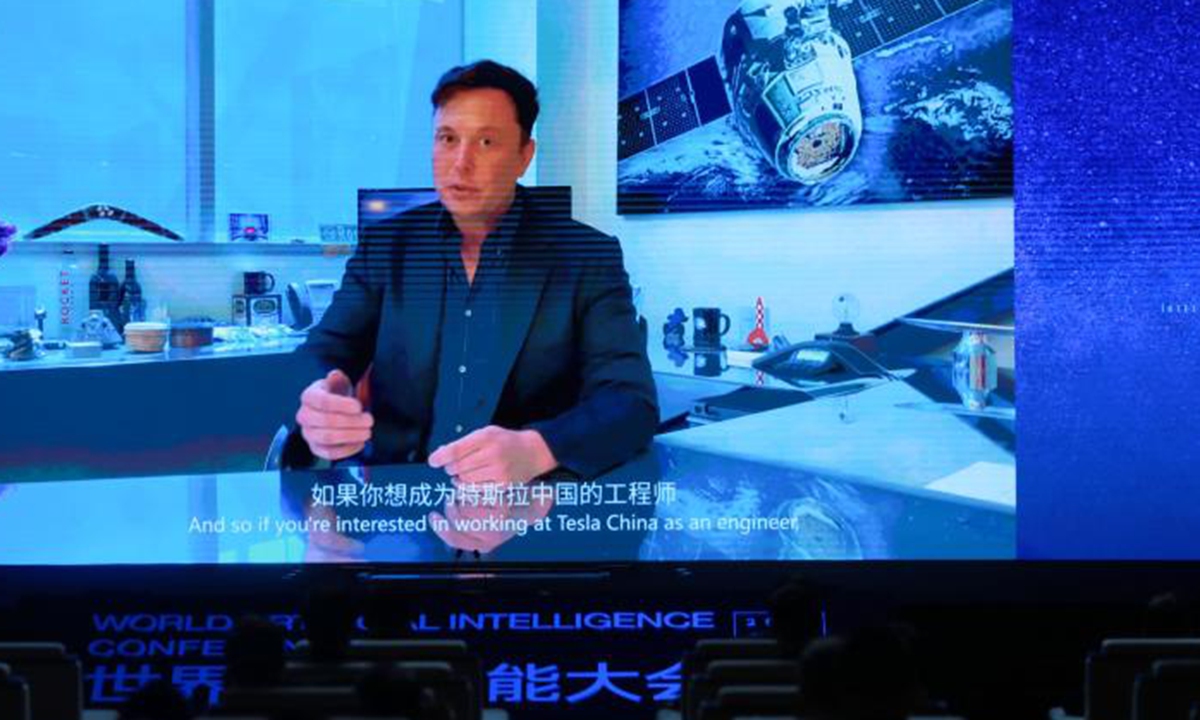SOURCE / INDUSTRIES
China’s AI sector makes strides despite COVID19 and US blockade

Tesla CEO Elon Musk delivers a video speech during the opening ceremony of the 2020 WAIC held in Shanghai. Photo: Courtesy of WAIC
China is going full steam ahead to develop artificial intelligence (AI) sector, with research and some applications already in a leading position, business representatives and government officials said Thursday.
The world's second-largest economy is working ceaselessly to build a massive AI industry despite some external challenges, including the COVID-19 pandemic and US government's technology blockade.
The efforts have borne positive results. By the end of 2019, China's AI core industries, with 2,600 companies, had realized 51 billion yuan ($7.3 billion) in industrial value, Minister of Industry and Information Technology Miao Wei said at the opening ceremony of the 2020 World Artificial Intelligence Conference (WAIC) Thursday in Shanghai.
Some US companies have taken note of China's achievements in AI. A spokesperson from Microsoft told the Global Times Thursday that, with the rapid development of technology in China, the country has not only developed its huge consumer market, but also become an important source of innovation for the whole world.
According to the spokesperson, China is "definitely in a leading position" in AI research and development, whether it comes to Chinese papers submitted and published at major global AI conferences or Chinese researchers who are engaged in AI research in universities and research organizations. Besides, China is making rapid progress in some AI technologies, such as quantum computing.
"In this environment, we have confidence in the development of AI in China. Given more time and talent inputs, China will definitely play a significant role in AI development in the world," the spokesperson said. Miao also stressed that some Chinese AI technologies, such as voice recognition, are now leading the world.
Meanwhile, Chinese industry giants are actively laying out AI-related businesses and making ambitious blueprints for AI development.
Baidu CEO Robin Li Yanhong said that Baidu plans to have more than five million smart cloud servers. It also looks to train 5 million AI talent in the next five years.
Ma Huateng, CEO of Tencent Group, also said during the WAIC that the tech giant is "studying and applying the new technology every day".
The country's top-down AI exploration happened at a time when China is engaged in what many describe as a fierce tech competition with the US, which went to impose a tech blockade on leading Chinese companies like . Huawei.
However, no matter how hard the Trump administration tries to block Chinese technologies rising in the AI race, US firms will not ignore the Chinese market, which has complex AI application scenarios to help promote their development, analysts said.
"The restrictions on normal communications on talent and technologies cannot obstruct the growing momentum of China's AI advances," said Zuo Shiquan, an expert in AI at the Beijing-based China Center for Information Industry Development. Zuo told the Global Times that China is ramping up efforts to carve its own advantages in the AI sector.
The Microsoft spokesperson noted that the company hopes to "deepen collaboration with the industry, academia and research in China," and together promote technological innovation and technology deployment in the country.
Apart from external political pressure, the pandemic has to some extent disrupted the business layout of Chinese AI firms in the first half of the year, as some technologies have been delayed into application in difference scenarios, Zuo said.
"However, we can see in some particular segments, especially the medical segment, that AI has embraced a good opportunity in expansion in China," Zuo noted.
Zhang Wenhong, head of Shanghai's COVID-19 medical experts' team, said during the WAIC that AI has played an important role in helping manage city life during coronavirus lockdowns.
